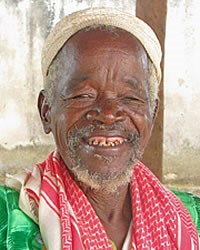Wassulu in Mali

Photo Source:
Wassulu Strategy Coordinator
|
Send Joshua Project a map of this people group.
|
| People Name: | Wassulu |
| Country: | Mali |
| 10/40 Window: | Yes |
| Population: | 245,000 |
| World Population: | 359,000 |
| Primary Language: | Maninkakan, Eastern |
| Primary Religion: | Islam |
| Christian Adherents: | 0.04 % |
| Evangelicals: | 0.03 % |
| Scripture: | New Testament |
| Ministry Resources: | Yes |
| Jesus Film: | Yes |
| Audio Recordings: | Yes |
| People Cluster: | Manding |
| Affinity Bloc: | Sub-Saharan Peoples |
| Progress Level: |
|
Introduction / History
A warm and hospitable people, the Wassulu of West Africa claim to originate from the Futa Jalon (Fulani) of Guinea. They tell various stories of their past. One oral account says that the Wassulu once lived among the Malinke, but in time were told to leave because of their pride and boastfulness about their many possessions. Though the historical accounts of the group's origin and of how they lost their original language vary, the fact that they speak a form of Bamanakan (Bambara) indicates the influence the Bamana (Bambara) people had as the Wassulu settled near them. Wassulu-Bamanakan is also closely related to other Northern Mande languages (Jula and Maninka) found in West Africa. Simply stated, the Wassulu have adopted some of the culture and language of the people they once lived among, while retaining their ethnic identity, thus forming a new people group with their own set of beliefs, traditions, and language.
As with many people groups, geopolitical borders do not define the area inhabited by the Wassulu people. The Wassulu region expands from the southwest corner of Mali, to the northwest corner of Ivory Coast and the northeast part of Guinea.
What Are Their Lives Like?
Their villages are often remote, and some are inaccessible by car at the peak of the rainy season. Like many West Africans, they live a simple lifestyle, depending on locally grown crops to feed themselves, with little dependency on food items brought into their region. Corn is an important grain in their diet, particularly in Mali. Peanuts, mangoes, and citrus fruits are found in some areas. Some grow cotton for export.
What Are Their Beliefs?
Islam was introduced among the Wassulu in the late 1800s. Although there is strong evidence of Muslim practices in their villages, many of the Wassulu also continue to follow traditional African religious beliefs and practices. This mixture of practices is commonly referred to as folk Islam. The number of Wassulu Christians is believed to be a very small percentage of the population. Christians of other people groups live among the Wassulu in some regions, but often there are cultural barriers that inhibit a natural sharing of the gospel.
What Are Their Needs?
Though historical facts are at times obscure, the spiritual needs of the Wassulu people are clear and unchanged.
Prayer Points
Pray for God to thrust out loving and committed workers to the Wassulus in Mali and Burkina Faso.
Pray for the Lord to give their elders and family leaders hearts that yearn for truth and righteousness.
Pray for the Lord to give them an abundant harvest as a testimony of his power and goodness.
Pray for every Wassulu village to have the chance to hear about the only savior.